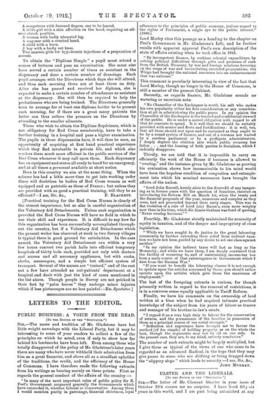LETTERS TO THE EDITOR.
PUBLIC BUSINESS: A VOICE FROM THE DEAD.
[TO THE EDITOR OF THE "SPECTATOR."] Sin,—The name and tradition of Mr. Gladstone have but little weight nowadays with the Liberal Party, but it may be interesting to some of your readers to collect a few of the principles on which be acted, even if only to show how far behind his landmarks have been left. Even among those who totally disapproved of the policy of Mr. Gladstone's later years there are many who have never withheld their admiration from Lim as a great financier, and above all as a steadfast upholder of the traditions, the credit, and the efficiency of the House
of Commons. I have therefore made the following extracts from his writings as bearing mainly on these points. First as regards the general conduct of the affairs of the country :— " In many of the most important rules of public policy Sir R. Peel's Government surpassed generally the Governments which have succeeded it, whether Liberal or Conservative. Among them I would mention purity in patronage, financial strictness, loyal adherence to the principles of public economy, jealous regard to the rights of Parliament, a single eye to the public interest." (1890.)
Lord Morley cites this passage as a heading to the chapter on Peel's Government in Mr. Gladstone's Life, and he further recalls with apparent approval Peel's own description of the state of affairs existing when he took office in 1841.
"By incompetent finance, by reckless colonial expenditure, by solving political difficulties through gifts and promises of cash from the British Treasury, by war and foreign relations hovering on the verge of war and necessitating extended preparations, the Whigs had brought the national resources into an embarrassment that was extreme."
This comment is peculiarly interesting in view of the fact that Lord Morley, though no longer in the House of Commons, is still a member of the present Cabinet.
Secondly, as regards finance, Mr. Gladstone sounds no wavering or uncertain note.
"No Chancellor of the Exchequer is worth his salt who makes his own popularity either his first consideration or any considera- tion at all in administering the public purse. In my opinion the Chancellor of the Exchequer is the trusted and confidential steward of the public. lie is under a sacred obligation with regard to all that he consents to spend. It is well that we should be suitably provided with armies and fleets and fortifications : it is well, too, that all these should rest upon and be sustained as they ought to be by a sound system of finance, and out of a revenue not wasted by a careless parliament or by a profligate administration. I deeply deplore the oblivion into which public economy has fallen . . . and the leaning of both parties to Socialism, which I radically disapprove.
Thirdly, we are told that it is impossible to carry on efficiently the work of the House if business is allowed to " overlap," and the instance given by Mr. Gladstone as proving his contention shows how inconceivable to his mind would have been the hopeless condition of congestion and entangle- ment into which his nominal successors have brought the affairs of the nation.
"Lord John Russell, keenly alive to the discredit of any tamper- ing as in former years with the question of franchise, insisted on introducing his Reform Bill on March 1st, when the treaty and the financial proposals of the year, numerous and complex as they were, had not proceeded beyond their early stages. This was in flat violation of a rule of Lord (sic) Bacon's, even more weighty now than in his time, which Sir James Graham was fond of quoting, `Never overlap business.' " Fourthly, Mr. Gladstone stoutly maintained the necessity of equity in taxation, and of the danger and impropriety of class legislation.
"While we have sought to do justice to the great labouring community by further extending their relief from indirect taxa- tion we have not been guided by any desire to set one class against another."
"In my opinion the indirect taxes will last as long as the Monarchy ; and while we have them, I am deeply convinced that the facility of recurring to, and of maintaining, income-tax has been a main source of that extravagance in Government which I date from the Russian War."
"If you want to benefit the labouring classes it is not enough to operate upon the articles consumed by them: you should rather operate upon the articles which give them the maximum of employment."
The last of the foregoing extracts is curious, for though primarily written in regard to the removal of restrictions, it is in a converse sense equally applicable to Tariff Reform.
Finally, we have his comments on the ownership of land written at a time when he had acquired intimate practical knowledge of the subject from his years of labour as trustee and manager of his brother-in-law's estate.
"I regard it as a very high duty to labour for the conservation of estates, and the permanence of the families in possession of them as a principal source of our social strength." " Reflection and experience have brought me to favour the method [of fee simple] of holding property as on the whole the best, though the arguments may not be all on one side. In the present case, they are, to my mind, entirely conclusive."
The number of such extracts might be largely multiplied, but I give these as typical of the views of one who came to be regarded as an advanced Radical, in the hope that they may give pause to some who are drifting or being dragged down the " slippery slope " which leads to anarchy. —I am, Sir, itc., JOHN MURRAY.














































 Previous page
Previous page